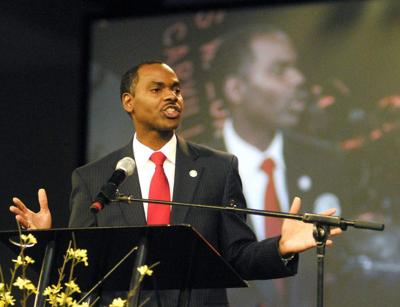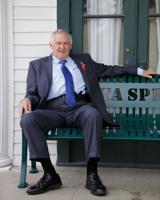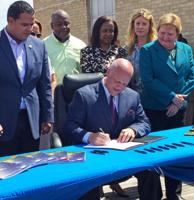President Donald Trump may not want the U.S. to participate in international climate initiatives, but the leader of one small Louisiana city on the Mississippi River thinks that’s a mistake and is urging other mayors to weigh in on the threat posed by climate change as well.
After Trump pulled the country out of the Paris climate agreement about a year ago, many American cities, non-profits, universities and corporations banded together and vowed in their own practices to uphold the spirit of the Paris accords, a worldwide collaborative effort to slow the advance of global warming.
WASHINGTON (AP) — President Donald Trump said Thursday he was withdrawing the U.S. from the Paris climate agreement, striking a major blow to …
The We Are Still In campaign reports they have over 2,700 signatories, but participation in Louisiana has been lackluster. The state has only seven members, the most notable of which are the city of New Orleans and Loyola University.
St. Gabriel Mayor Lionel Johnson wants to change that. He wants his own town and others in Louisiana to sign the We Are Still In pledge so all can perform "our little part in climate action."
Leaders of cities along the Mississippi River have chosen St. Gabriel Mayor Lionel Johnson Jr. to head up efforts to encourage ecologically-co…
Johnson was elected to lead the Mississippi River Cities and Towns Initiative last year, and from his new perch, he's argued for more green investment. At a recent environmental conference in Boston, he shared the story of Louisiana's devastating 2016 floods. They are proof that humans need to live harmoniously with the rest of nature, he said in an interview.
"Climate issues are something we really need to start addressing. ... God has given us two things. He's given us life and he's given us this planet to live on," Johnson said.
WASHINGTON (AP) — Directly contradicting President Donald Trump, a draft report produced by 13 federal agencies concludes that the United Stat…
It's time to move past political rhetoric and begin examining what local governments can do to pitch in, he continued. Along the Mississippi, cities are doing their part to peaceably cohabitate with the river, building reservoirs in Arkansas and floodable parks near St. Louis, restoring tributaries in Iowa and fixing wetlands in Illinois.
Johnson said cities don't necessarily need to pursue grand infrastructure projects, they just need to be mindful of the environmental impacts of their decisions, such as the effect of new developments on the floodplain.
East Baton Rouge is currently weighing changes to its building codes and floodplain construction standards. A concentrated grass roots effort could compel the state to build infrastructure to the level of the 500-year flood rather than the 100-year standard that has washed so many buildings out in recent memory, said Carl Pope of Bloomberg Philanthropies, one of the We Are Still In organizers. While Louisiana is at it, they can demand more efficient heating and cooling machines and more environmentally sound buildings with features like reflective roofs, he continued.
The group’s leaders believe a coalition of locals can dream big.
"There's tremendous power when you bring cities together," Pope said.
For example, Pope said, municipalities in Illinois have banded together as a purchasing block so they can demand cheaper prices on electricity fueled by renewable resources, which reduces the reliance on coal-fired plants that release deleterious chemicals into the environment.
Some Louisiana leaders have made their own pledges, emphasized Jodie Van Horn of the Sierra Club, another leader of the We Are Still In organization.
Abita Springs has committed to 100 percent renewable electricity by 2030, and New Orleans plans to halve emissions by the same year. The news out of Abita Springs was especially heartening for Van Horn, because the mayor there is a Republican. Climate change has become such a "tribal marker," but both sides of the political aisle have to breathe the air that’s polluted when refineries aren't held to the appropriate standards, Pope said.
In just 13 years, Abita Springs' elected and civic leaders hope to be able to say that everything in the town, from homes and businesses to pu…
"What we're really concerned about is what people do, not what label they use while they're doing it," he continued.
Loyola Prof. Bob Thomas sees his role as facilitating discussion.
As a teacher of both biology and communications, Thomas said researchers must explain the scientific consensus on climate change as they would to their friends: in a way that is respectful and which addresses critics' concerns, gaps in information and evolving understanding of the issue. As a Jesuit institution, the school is compelled to be stewards of the environment and champion sustainable practices, Thomas said.
While the professor teaches respect and understanding for individuals unconvinced of climate change, he was sharply critical of a federal government run by denialists.
"We need to chain our arms together and stand up to the government ... and let Washington know that this is totally unacceptable," he said.
The outgoing Mitch Landrieu administration in New Orleans declined to comment for this story. East Baton Rouge Mayor-President Sharon Weston Broome released a brief, non-specific statement.
Mayor Mitch Landrieu unveiled a plan Friday to cut New Orleans’ greenhouse gas emissions by half over 13 years — an effort to combat at the lo…
"As Mayor-President, I am certainly committed to an environmentally sound community. This is a goal of businesses and the citizenry of Baton Rouge. I join other local leaders who support a clean energy future for our community," she wrote.
Cherelle Blazer, of the Sierra Club, said Louisiana is brimming with opportunities for sustainable practices like solar-powered electricity. She hopes local governments and electric co-ops use their numbers to affect change, since the state is already ground zero for land loss caused by the rising seas associated with climate change.
"If there's anywhere people should be signing on to We Are Still In, it should be Louisiana," she said.









